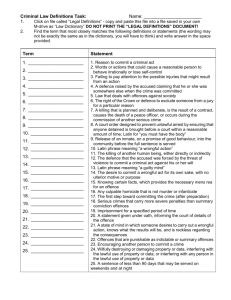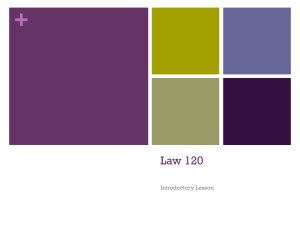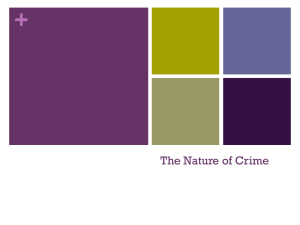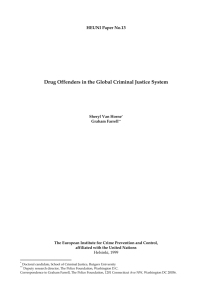Other Offence Creating
advertisement
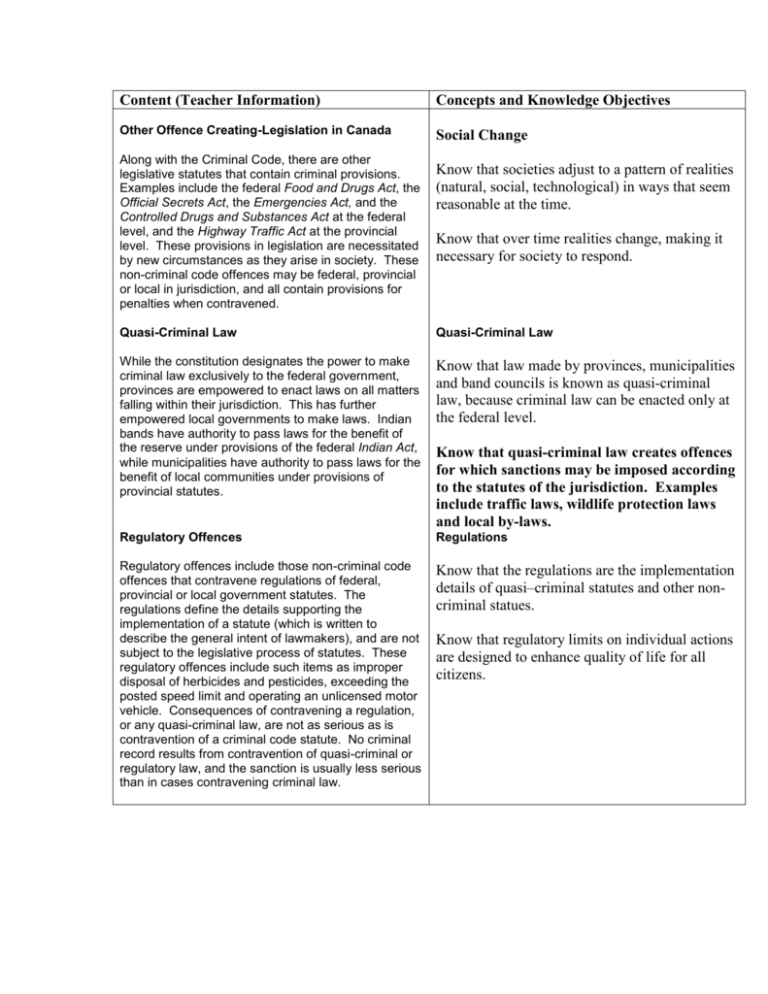
Content (Teacher Information) Concepts and Knowledge Objectives Other Offence Creating-Legislation in Canada Social Change Along with the Criminal Code, there are other legislative statutes that contain criminal provisions. Examples include the federal Food and Drugs Act, the Official Secrets Act, the Emergencies Act, and the Controlled Drugs and Substances Act at the federal level, and the Highway Traffic Act at the provincial level. These provisions in legislation are necessitated by new circumstances as they arise in society. These non-criminal code offences may be federal, provincial or local in jurisdiction, and all contain provisions for penalties when contravened. Know that societies adjust to a pattern of realities (natural, social, technological) in ways that seem reasonable at the time. Know that over time realities change, making it necessary for society to respond. Quasi-Criminal Law Quasi-Criminal Law While the constitution designates the power to make criminal law exclusively to the federal government, provinces are empowered to enact laws on all matters falling within their jurisdiction. This has further empowered local governments to make laws. Indian bands have authority to pass laws for the benefit of the reserve under provisions of the federal Indian Act, while municipalities have authority to pass laws for the benefit of local communities under provisions of provincial statutes. Know that law made by provinces, municipalities and band councils is known as quasi-criminal law, because criminal law can be enacted only at the federal level. Regulatory Offences Regulations Regulatory offences include those non-criminal code offences that contravene regulations of federal, provincial or local government statutes. The regulations define the details supporting the implementation of a statute (which is written to describe the general intent of lawmakers), and are not subject to the legislative process of statutes. These regulatory offences include such items as improper disposal of herbicides and pesticides, exceeding the posted speed limit and operating an unlicensed motor vehicle. Consequences of contravening a regulation, or any quasi-criminal law, are not as serious as is contravention of a criminal code statute. No criminal record results from contravention of quasi-criminal or regulatory law, and the sanction is usually less serious than in cases contravening criminal law. Know that the regulations are the implementation details of quasi–criminal statutes and other noncriminal statues. Know that quasi-criminal law creates offences for which sanctions may be imposed according to the statutes of the jurisdiction. Examples include traffic laws, wildlife protection laws and local by-laws. Know that regulatory limits on individual actions are designed to enhance quality of life for all citizens. Skills/Abilities Objectives Values Objectives Develop and apply criteria as a basis for coming to conclusions. Appreciate that the outcome of any evaluation is dependent upon the criteria selected as the basis for making judgments. Apply skills of dialectical evaluation: defining relevant viewpoints within the information testing the view points for factual accuracy testing the viewpoints for their morality evaluating the factual and moral testing forming a conclusion about the issues. Understand that criminal law reflects moral values and social policy objectives in the context of the society in which it operates. Appreciate the differences between criminal law, quasi-criminal law and regulatory offences. Apply the moral tests of: role exchange universal consequences new cases. Instructional Notes 1. Ensure students understand that regulatory and quasi-criminal offences are in fact contrary to law, and carry penalties for unlawful conduct. Create a listing of quasicriminal and regulatory offences from student experiences. 2. Have students create a chart comparing regulatory offences, quasi-criminal offences, and Criminal Code offences. 3. Have students reflect on impaired driving laws. Engage in dialectical reasoning exercise to answer the question, “Are the Canadian impaired driving laws effective?” Issues in the Law 1. Examine a criminal law such as impaired driving. What are the moral reasons for its criminalization? What social policy objectives are reflected in the impaired driving laws in Canada? 2. Reflect upon ways in which laws restrict our freedom. Then explore ways in which laws improve our freedom. Write a brief reflection paper discussing whether Canadian law is more than a set of rules telling individuals can not do.
